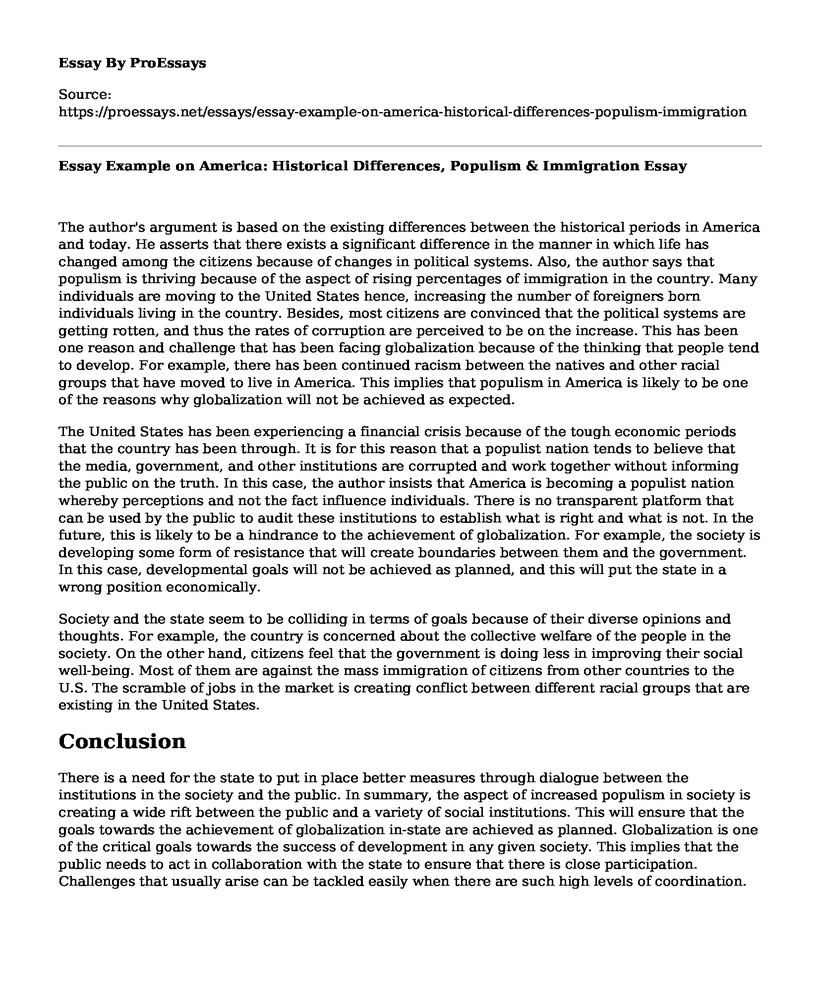The author's argument is based on the existing differences between the historical periods in America and today. He asserts that there exists a significant difference in the manner in which life has changed among the citizens because of changes in political systems. Also, the author says that populism is thriving because of the aspect of rising percentages of immigration in the country. Many individuals are moving to the United States hence, increasing the number of foreigners born individuals living in the country. Besides, most citizens are convinced that the political systems are getting rotten, and thus the rates of corruption are perceived to be on the increase. This has been one reason and challenge that has been facing globalization because of the thinking that people tend to develop. For example, there has been continued racism between the natives and other racial groups that have moved to live in America. This implies that populism in America is likely to be one of the reasons why globalization will not be achieved as expected.
The United States has been experiencing a financial crisis because of the tough economic periods that the country has been through. It is for this reason that a populist nation tends to believe that the media, government, and other institutions are corrupted and work together without informing the public on the truth. In this case, the author insists that America is becoming a populist nation whereby perceptions and not the fact influence individuals. There is no transparent platform that can be used by the public to audit these institutions to establish what is right and what is not. In the future, this is likely to be a hindrance to the achievement of globalization. For example, the society is developing some form of resistance that will create boundaries between them and the government. In this case, developmental goals will not be achieved as planned, and this will put the state in a wrong position economically.
Society and the state seem to be colliding in terms of goals because of their diverse opinions and thoughts. For example, the country is concerned about the collective welfare of the people in the society. On the other hand, citizens feel that the government is doing less in improving their social well-being. Most of them are against the mass immigration of citizens from other countries to the U.S. The scramble of jobs in the market is creating conflict between different racial groups that are existing in the United States.
Conclusion
There is a need for the state to put in place better measures through dialogue between the institutions in the society and the public. In summary, the aspect of increased populism in society is creating a wide rift between the public and a variety of social institutions. This will ensure that the goals towards the achievement of globalization in-state are achieved as planned. Globalization is one of the critical goals towards the success of development in any given society. This implies that the public needs to act in collaboration with the state to ensure that there is close participation. Challenges that usually arise can be tackled easily when there are such high levels of coordination.
Cite this page
Essay Example on America: Historical Differences, Populism & Immigration. (2023, May 29). Retrieved from https://proessays.net/essays/essay-example-on-america-historical-differences-populism-immigration
If you are the original author of this essay and no longer wish to have it published on the ProEssays website, please click below to request its removal:
- Sexual Abuse by Peacekeepers in the Central African Republic
- Social Media and Its Positive Impact in the Contemporary Society Paper Example
- Comparative Analysis of American Indian History Essay
- The Grand Canyon of the Colorado River Essay
- Annotated Bibliography: How Domestic Violence Affects Immigrants in the Hispanic Community in the United States?
- Research Paper on Failure of the Boxer Rebellion in China
- Essay Sample on Broken Windows: A Theory of Neighborhood Deterioration







